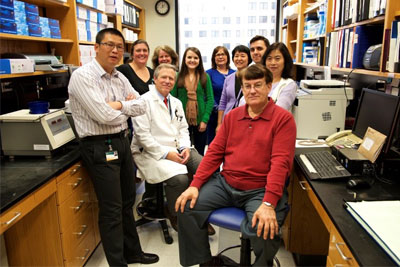Asthma affects approximately 10 percent of the U.S. population and is estimated to cost the country $18 billion every year in healthcare expenses. People with asthma have greater and more diverse number of bacteria in their lungs and studies have shown that their immune systems don't react the same way to infection compared to those without asthma. Industrial countries like the United States, United Kingdom and China have higher rates of asthma and allergies due to decreased early life exposure to infection causing bacterium known as microbes.
 Arthur Totten, a Ph.D. candidate in Microbiology at the University of Alabama at Birmingham and an asthmatic himself, studies how allergy sufferers react to bacterial infections. Understanding how asthma alters the immune response to infection is important to developing medical treatments. At his Discoveries in the Making presentation at Homewood Public Library on September 8, Arthur talked about a pathogen only found in humans called Mycoplasmas Pneumoniae (Mpn) — the bacteria that causes walking pneumonia.
Arthur Totten, a Ph.D. candidate in Microbiology at the University of Alabama at Birmingham and an asthmatic himself, studies how allergy sufferers react to bacterial infections. Understanding how asthma alters the immune response to infection is important to developing medical treatments. At his Discoveries in the Making presentation at Homewood Public Library on September 8, Arthur talked about a pathogen only found in humans called Mycoplasmas Pneumoniae (Mpn) — the bacteria that causes walking pneumonia.
Walking pneumonia bacteria thrives in close quarters like prisons, dorms and barracks. They’re usually found in the nose, throat, and lungs of their host. Carriers of this bacterium often don’t know they have it because symptoms usually don’t manifest until a month after they become infected. When a carrier coughs or sneezes, they’re unknowingly spreading the bacteria. Symptoms include fatigue, fever, persisting cough, and in rare cases, pneumonia.
Asthma affects the body’s ability to produce antibodies after the initial infection. This is why scientists believe asthmatics suffer from common ailments (such as the common cold and flu) longer than non-asthmatics. Arthur and his lab wanted to know, “does asthma change the ability of a host to mount an effective antibody response during infection?” The short answer is yes. Arthur’s lab replicated the Mycoplasmas bacteria to recreate the infection and test it on an animal model. Because these pathogens are only found in humans, Arthur had to use a living organism similar to the human anatomy — in this case, mice.
They found that bacterial infection in addition to the asthma model actually enhanced the asthma-related antibody (IgE) levels. This has been seen in humans, but never before been reported in an animal model. These findings can be very impactful for medicine; this may even improve the vaccines currently used to prevent diseases on asthmatics! Arthur hopes this can one day improve patient care and lead to a decrease of outbreaks and infections of asthma patients.
